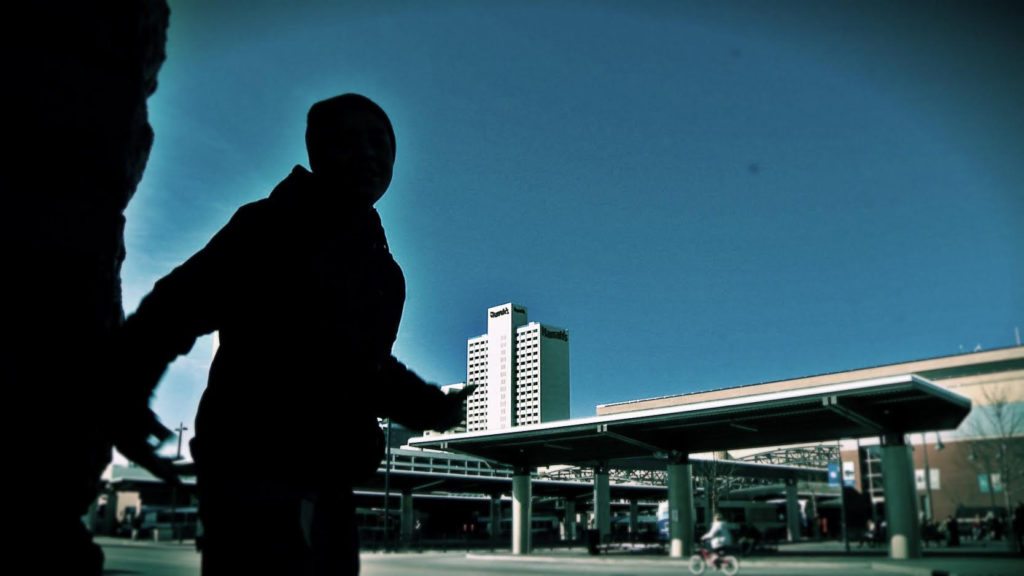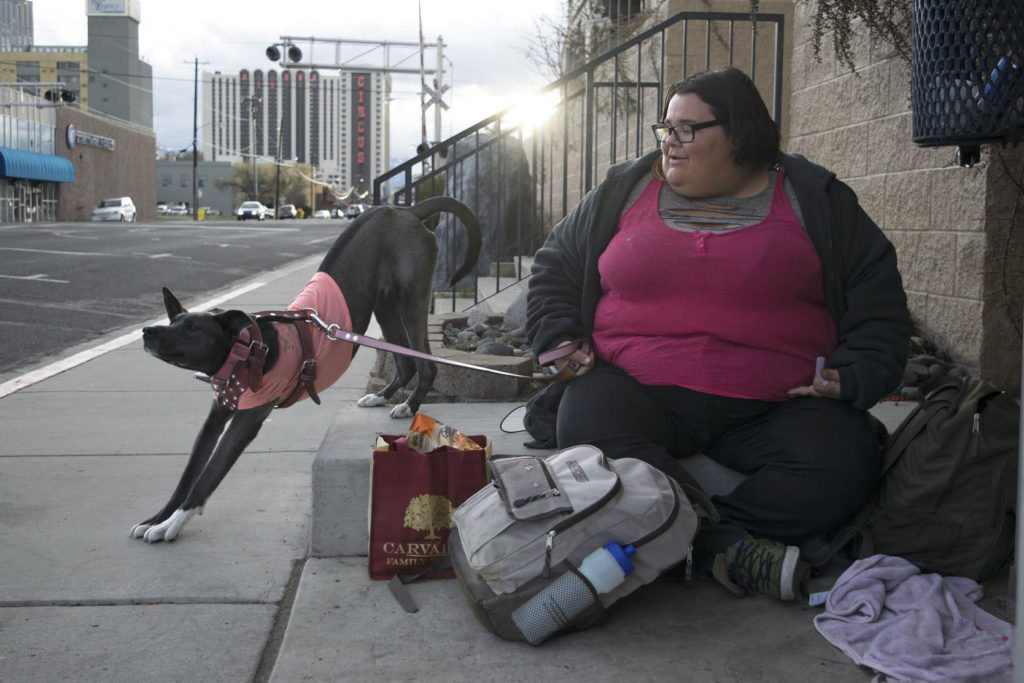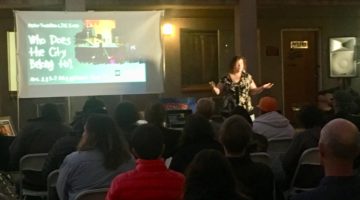- An anonymous homeless teenager approaches Nico Colombant, one of the founders of Our Town Reno to tell her story for their upcoming documentary, “Invisible Girl.”
- Angela, a 19-year-old homeless woman, rests on a sidewalk in downtown Reno with her service dog. Our Town Reno is dedicated to telling the stories of homeless people in Reno.
- Photo Courtsey of Our Town Reno Corey McDowell, a University of Nevada, Reno, student perfoms street art in downtown Reno for an Our Town Reno documentary called “Invisible Girl.” McDowell said while she was homeless, she got support from the downtown Reno homeless community, who helped quiz her for upcoming quizzes and exams.
Reno is changing. The Biggest Little City is growing exponentially every year. Nevada was the state with the fastest-growing private sector in 2015 with 4.5 percent job growth, according to the Nevada Department of Employment, Training and Rehabilitation, a title the state hasn’t held since 2005.
The growth rate is just as high in northern Nevada. DETR predicts northern Nevada can expect close to 10,000 new jobs per year, which means the region needs 5,000 new homes per year. The national moving company United Van Lines found in a survey that Nevada is the second most popular destination in the Western United States for people moving to a new area.
As Reno welcomes the new, some people are wondering what will happen to the people and places that are already here.
Our Town Reno is a collective multimedia street-reporting project dedicated to shedding light on this question and more specifically on issues of poverty, homelessness, blight, affordable housing, gentrification and displacement in the Biggest Little City.
Nico Colombant, a full-time staff member and lecturer at the Reynolds School of Journalism at the University of Nevada, Reno, got the idea for an online collection of stories about homelessness and other issues in Reno throughout his first years at UNR as an adjunct professor.
“I noticed that with a lot of the students, some of their first stories often were about homeless people,” Colombant said. “The stories were really well-done, but I also noticed that as they went along in their classes that they stopped reporting about it.”
Realizing a need for more coverage on these issues, Colombant reached out to one specific student, Jose Olivares.
Olivares, a senior at UNR dual-majoring in journalism and sociology, said he had first become interested in the homeless population in Reno after talking with one of his friends. He decided to pursue the topic, eventually publishing multiple pieces detailing the situation in Reno, profiling affected individuals and exploring potential solutions.
“I saw that really nothing was being done in Reno to help out homeless folks or to find a solution to homelessness, so I decided to write a piece kind of bringing attention to it,” Olivares said. “[The story] actually did pretty well. It got around … and it was interesting to see that our community had a need to get information on homelessness and homeless issues and gentrification and exactly what it is in Reno.”
Together the two started brainstorming project ideas in the fall, and in January of 2016 they launched Our Town Reno, a name that Colombant’s wife, Kari Barber, came up with.
The project, which chiefly operates on social media platforms, has gained a steady following of over 1,500 on Instagram and almost 1,200 on Facebook over the year. It is an open-community project, meaning anybody can contribute content. UNR students, professors and community members can all put together visual, audio and video stories about these issues affecting Reno, Colombant said.
Our Town Reno, unlike traditional news media platforms, focuses on micro-storytelling. Instead of writing long-form news pieces with each side of the story and different opinions clearly mapped out, contributors focus on telling the stories of particular individuals in Reno and what is happening to them today, Colombant said.
“The Our Town Reno approach is a very humanist approach while using a new technological platform,” Colombant said.
Both Olivares and Colombant agree one of the most valuable things about Our Town Reno is the conversations that happen online because of this technological platform.
The comments section under each post on Facebook is full of community members’ voices. There are suggestions about possible solutions and questions from concerned citizens. Occasionally arguments happen, but they often self-mediate and reach a common ground, Colombant said. There are even people who offer help to the people profiled by Our Town Reno.
After Olivares profiled a 72-year-old homeless man named Doug living on the porch of a condemned house in downtown Reno, there was an outpouring of support. Only a few weeks later, Doug had been given the help he needed when the Reno Sparks Homeless Veterans group saw his story on Facebook and gave him a place to stay, complete with a real bed, Olivares and Colombant said.
Our Town Reno not only sheds light on homelessness in Reno but also on issues surrounding displacement, old structures, gentrification, poverty and Reno’s rebrand. One of the most inspiring sections highlights local Reno heroes, people who are making a difference with their work in the local community, Colombant said.
“Oftentimes these people will be quoted in [news] articles, but they won’t be the entire focus of an article” Colombant said. “We like to put the entire focus on a particular person. It’s a way to shine a light and show that their work is important.”
Colombant, Olivares and other contributors are also doing important work. As Reno rebrands, the city seems to have forgotten the people and buildings that are already in Reno and need help, Colombant said.
“Can’t the Biggest Little City be a caring Biggest Little City?” Colombant said.
Olivares first felt the impact of the work he has been doing after interviewing a 19-year-old homeless woman named Angela and her service dog.
“It was really impactful to see someone younger than me in this situation” Olivares said. “It was very unjust and nobody, regardless of age, should be in that situation.”
Our Town Reno is just getting started. Recently Our Town Reno paired with the newly formed Reynolds Media Lab, which is dedicated to creating meaningful media at the Reynolds School of Journalism. Our Town Reno also wants to continue focusing on bringing out content that keeps up with our technologically advanced society, Colombant said.
“We’re doing this both as important reporting but also using new tools to tell these stories,” Colombant said.
Our Town Reno is debuting one of its most recent projects, a short documentary about youth on the streets of Reno titled “Invisible Girl,” at a screening on Wednesday, Oct. 26, at The Potentialist Workshop downtown. Free events like this and also the production of more documentaries and larger projects are something the Our Town Reno team hopes to accomplish in the future, Colombant said.
For more information on Our Town Reno, visit ourtownreno.com or visit the team’s social media pages on both Instagram and Facebook.














